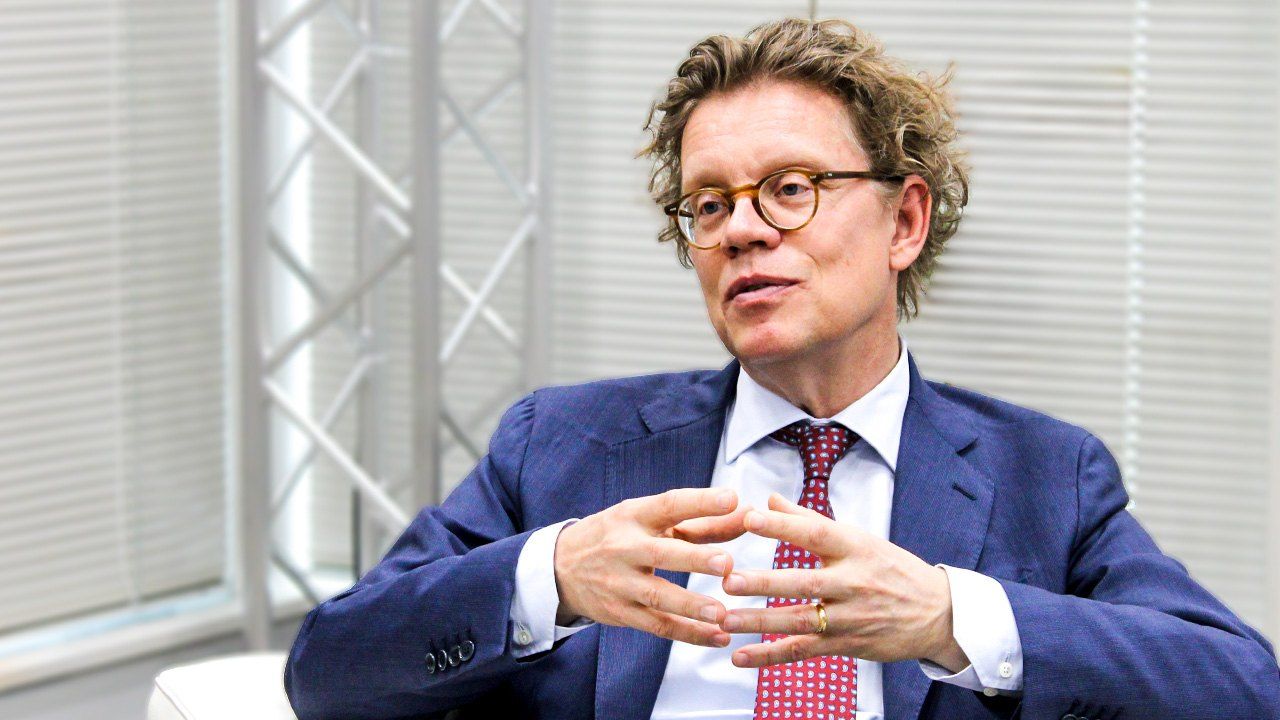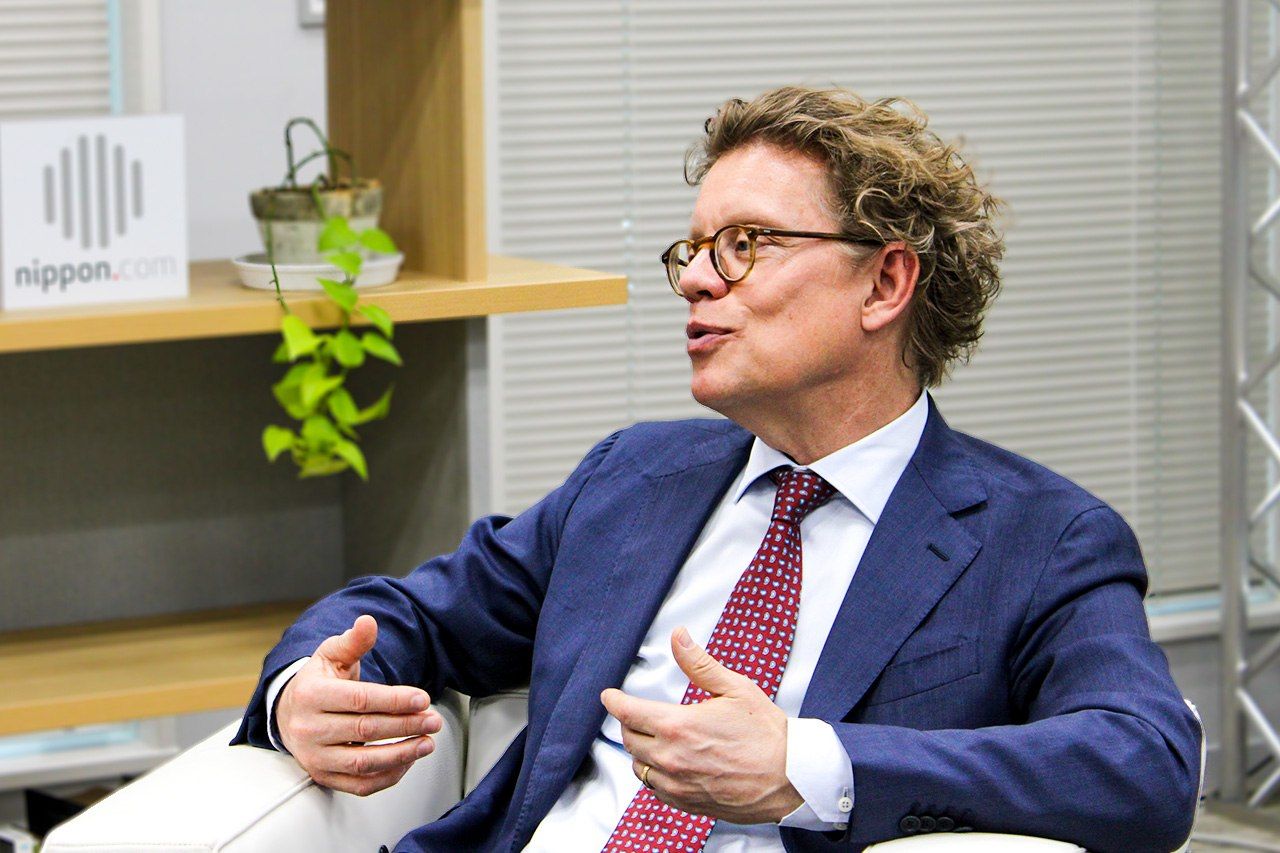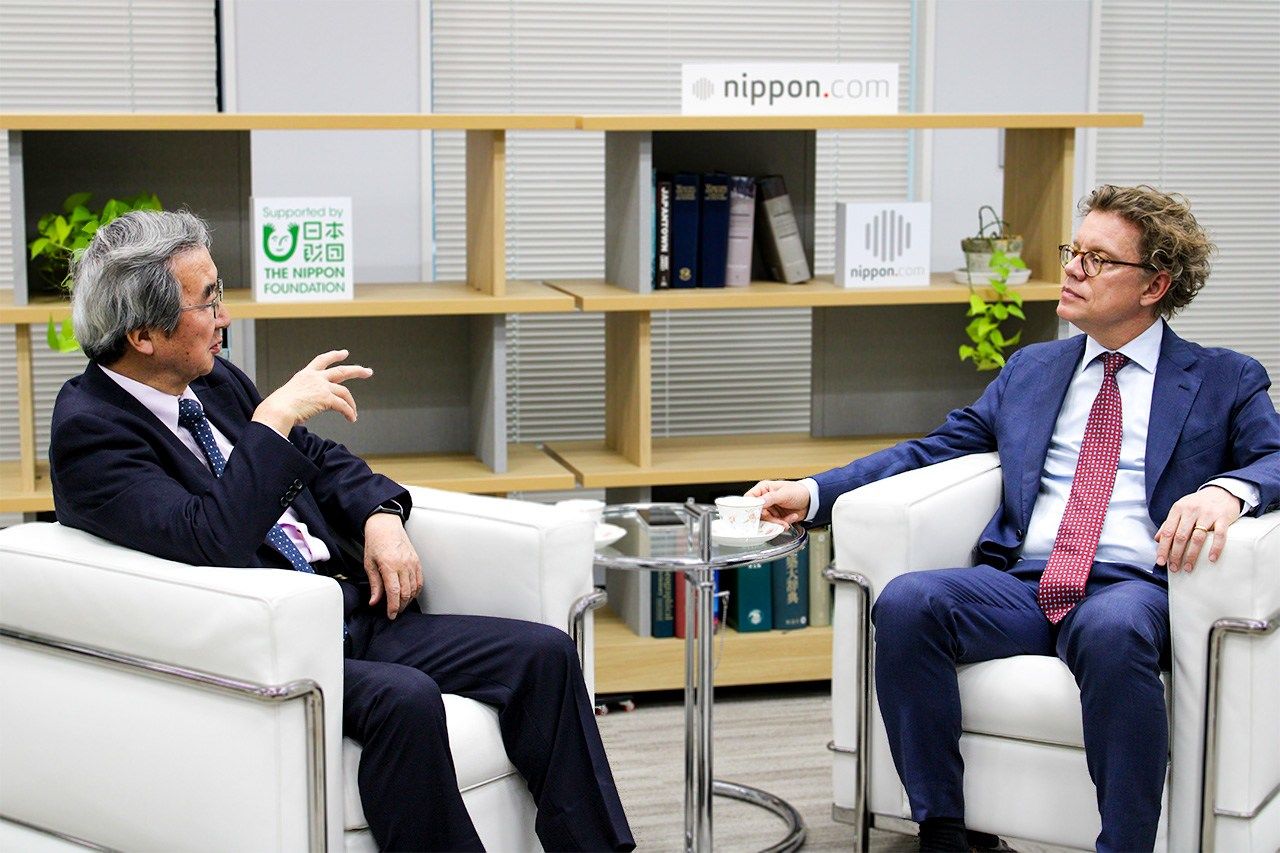
A Swedish Take on the “Way Forward” for Japan
Politics Global Exchange- English
- 日本語
- 简体字
- 繁體字
- Français
- Español
- العربية
- Русский
Sweden as NATO’s Newest Member
INTERVIEWER Thank you very much for visiting us today. Let me start with a question about Russia. Sweden has joined NATO, and you had celebrations on March 18 in Stockholm to mark this. How strongly do the Swedish people feel about the military threat from Russia, though?
PERERIC HÖGBERG The threat is very real. And it’s interesting that we’re having this interview today, on April 4, since it was exactly seventy-five years ago that NATO came to life.
It’s about geography—a bit like Japan’s relationship with your big neighbors. Sweden is very close to Russia, geographically, but I did not expect that we would see a war in Europe as we have seen over the past two years. Since the collapse of the Soviet Union we have been hoping that we would see peaceful development in the European region, as well as throughout the rest of the world.
Perhaps this was naïve, though. Go back in time and you see strong signals from the Vladimir Putin regime—in Georgia in 2008, the annexation of Crimea in 2014—but although we’ve been worried, we’ve always thought that through dialogue with Russia we’d be able to move forward in a peaceful manner.
At the end of 2021, though, a few months before its invasion of Ukraine, Russia was sending out ultimatums telling us not to join NATO as this would disturb the security balance. This is an enormously provocative thing for a big power to do to a smaller country. Then, when the invasion actually happened, the red line was crossed. For Sweden and Finland, our whole reality had changed.
It’s important to remember history. Sweden was fortunate to remain outside of wars for some 200 years since the last war we fought against Norway in 1814. Our decision to take a neutral approach to world affairs served us very well, although of course we’ve had some feelings of guilt that our neutrality prompted us to make some concessions during World War II, such as by letting Germans pass through our country.
But our neutrality stopped when we joined the EU in 1995 and became militarily nonaligned instead. And following Russia’s invasion of Ukraine, the question of NATO membership became a very topical one. This is the core of the matter—the Swedish people felt that our security situation had changed dramatically, and we needed to make a decision.
When the Swedish flag was raised at NATO headquarters a few weeks ago, it’s important to note that it wasn’t just the prime minister and supreme commander of our military in attendance—Crown Princess Victoria was there, along with heads of the country’s political parties, sending a signal to the Swedish people, our partners, and Russia and other countries in the world that this wasn’t just a political thing. The Swedish nation has chosen to join NATO, for two reasons—first, for its own defense, and second, in order to contribute to increased stability in Europe as a provider of defense and security.
Navigating a Changing Security Landscape
INTERVIEWER You’ve already achieved the defense expenditure level of 2 percent of GDP?
HÖGBERG We’re aiming for it, and it will happen this year or next year. After the fall of the Soviet Union and the Berlin Wall, we scaled down our military out of a belief that it wasn’t needed so much. Now we’re boosting defense spending quickly.
All thirty-two NATO members want to see transparency and long-term predictability in support for Ukraine. We need to be very clear in finding ways to show Russia that there’s no way it can win a war against another European country.
INTERVIEWER You reintroduced conscription a couple years ago. Have young people accepted this?
HÖGBERG Actually they have. The number of young people seeking to join the armed forces is going up. Interestingly, the number is also rising dramatically for people registering for the voluntary civilian defense force. And this also includes females interested in volunteering and supporting the country defense structures.
Conscription is mandatory, but we don’t take everyone; we don’t need that many people. Everyone is asked to come and fill out the forms, but not all are asked to join. We have more people who want to join than those who can.
INTERVIEWER Remarkable. The Nippon Foundation carries out a youth opinion survey, and the results of the last survey show that only 13 percent of young Japanese people are willing to fight in a war to defend their country.
HÖGBERG This is perhaps because the idea of an invasion is still so far from the minds of the Japanese. The full-scale Russian invasion of a democratic country just over an hour’s flight away from us has shaken us—it’s no longer theoretical, and we have to plan properly. Now, do I fear a Russian invasion of Finland or Sweden? No, not in the short term. But if the rest of the world simply accepts Russia’s taking of part or all of Ukraine, then I worry about what follows.
The Swedish Take on Demographic Challenges
INTERVIEWER In recent years you’ve accepted many refugees, particularly from Syria and elsewhere in the Middle East. What is the level of Swedish interest in the future course of the conflict in Gaza?
HÖGBERG There’s a lot of interest—not only because we have many Swedish citizens who have origins in this part of the world, but also because this is a key issue of the global world order. Ukraine is now the main focus, as it has to be, but from a multilateral perspective, all other conflicts are important as well. Sweden has always been engaged when it comes to conflicts, unfairness, lack of democracy and human rights—perhaps because of our fortune to have peace for so long. And now is no different.
We must not lose track of the horrendous crimes that Hamas committed in October 2023, of course. Israel absolutely has the right to defend itself. But the response has to be in the framework of the rules of war, with heed paid to humanitarian considerations. The worst situation would be for this conflict to spread, so we have to make sure we avoid this risk. Dialogue and talks are so important.
I have no idea when we will see an end to these conflicts. By training I’m a political scientist, so moving away from my role as ambassador, I have always been interested in questions like this—trying to learn from history and predict the future, or at least avoid catastrophes in the future. My conclusion is, unfortunately, that humans have always been bad at predicting the future and at learning from history. Education is important—being honest about the facts, even when they are not pleasant.
Look at Japan, in this connection: You have yet to bring about an official end to the war with Russia, with no peace treaty in place, and the Korean conflict remains in a long-lasting stalemate. The international community must be very careful not to create stalemates and push problems to future generations.
INTERVIEWER Changing the subject to population issues, in Japan the decreasing number of children is one of the most worrisome subjects we face. People struggle to understand why the population is decreasing so dramatically. But Sweden has shown some success in maintaining a higher level of fertility.
HÖGBERG I think the number one issue is the lack of new babies. In Europe, too, there are very low fertility rates. But maybe this is a natural economic development: In the past, families were too big, but as the economy develops, their size decreases. The question is what to do when this decrease threatens the society itself, as it seems to be doing in Japan.
In Sweden, we have done three things. First, we made it possible for women with young families to have both children and careers. This started long ago. When leaders in Sweden began considering gender equality, it wasn’t solely for the human rights aspect. We needed more people in the workforce, and the trick was to make sure that Swedish women could work. Today almost all of them do. By law, Swedish municipalities must provide childcare to families that want it.
Second, we scrapped cotaxation. Everyone who makes money in Sweden is taxed individually, not on a household basis. And third, there’s a very strong parental support system. Money is paid for each child in a family, regardless of other childcare benefits that are available.
This all started in the 1970s, creating a strong system enabling people to have both careers and kids. But—and this is Sweden in a nutshell, and something different from Japan—we also imported a lot of labor. Today there are about 10 million people in Sweden, but fully 25 percent of them were either born in another country or have parents who were born abroad. They are Swedes, with citizenship and voting rights. This immigration started with people from Finland, Turkey, and Chile, but gradually we moved away from seeking skilled workers to more humanitarian programs, receiving refugees from the Horn of Africa, from Iraq, from Syria and Afghanistan.
This has created integration problems, which are at the core of the political discussion on this. Asylum numbers have been reduced from the past, but once these people are here, we can’t throw them out. This was our way of solving the declining population issue.
The Happiness Question
INTERVIEWER France strikes me as another country that has successfully overcome this demographic challenge. But there, as in Sweden, I understand, there are many births outside of marriage, in single-parent homes. It seems that this is a change that has come about relatively recently. In Japan, meanwhile, only 2 or 3 percent of children are born out of wedlock.
HÖGBERG I think this comes from a liberalist way of viewing the rights of the individual. It’s connected with what I just mentioned, the support for people to get them into the workforce, and of course with the liberation of women.
It’s also changed tremendously. In my grandparents’ generation, marriage was the institution that was needed. Now, our support systems—for children, for unemployment and other forms of social support—are independent from marriage. Many Swedes live together without being married, and there are formal recognitions of cohabitation status that kick in quickly. And many marriages, perhaps 50 percent, do end in divorce. So the institution has gone through dramatic change.
Joint custody is something I’m glad to see being discussed in Japan. There’s not much I’m critical of here, but this is one area. If parents choose to go separate ways, that’s their problem; but one should not take away a child’s rights to have access to both parents. Here Sweden is strong in stating that the child has the right to access both the mother and the father (or mother and mother, or father and father, as the case may be nowadays).
INTERVIEWER Sweden is always ranked near the top of the list of the happiest countries in the world. What are your secrets here?
HÖGBERG I have problems with this—how do you measure happiness scientifically? I don’t know that it’s a fair description to say we’re always near the top in terms of happiness. But I do believe that if you’re lucky enough to be born in Sweden, as I was, you grow up with a welfare state protection system. This creates stability and takes away many of the worries that human beings have about their futures in many other countries.
As a young Swede you go to school and are educated. You meet teachers and other adults who encourage you to think outside the box. You train your mind and are encouraged to take risks, and if you fail, it’s OK. Give it a go! That creates happiness, I think. I try to raise my children that way as well. I realize that I’m in a privileged position, but I encourage them to try what they want to do. This is a notion in Swedish society: You can try, and you’ll have protection if you fail. It creates comfort and courageousness.
INTERVIEWER You’ve been here for five years now, and will be heading back to Sweden at the end of this posting. What messages would you leave with younger Japanese people?
HÖGBERG Well, my job is not to have strong views on Japanese society, but to find opportunities for stronger links between our two countries. So my first message is that there’s opportunity for mutual benefits between Japan and Sweden, Japan and the Nordic countries. Our ties are already strong, which is perhaps why this is never in the news, like the Japan-China relationship, say. If you look at trade, economic ties, and so on, there’s so much there making our countries “click” together.
Second, I’d encourage people to think for themselves. Don’t believe everything you hear from your professors. We need to have that base for ourselves—to think, to fact-check. I hope they will be more courageous as a way of achieving their happiness. Be fearless in asking for answers and stating your views.
In closing, I’d add that Sweden, along with other countries in Europe, needs to observe what Japan has been accomplishing. There’s so much here that is admirable: The number-one country Swedish people want to go to after the pandemic is Japan. Your country should be careful not to smash everything that makes it Japanese. The safety, the politeness, people being treated with respect. In much of the world we’ve lost some of this.
INTERVIEWER One key word for us now is diversity. We’re coming to understand the attractiveness of being different, and we have a lot to learn from the Nordic countries about respect for different ideas, different people.
HÖGBERG This is what democracy is all about. The image of Sweden in Japan is often too rosy, but what I do admire about my country is that there are no forbidden subjects. We put it all on the table and solve our issues with new ideas, with an eye on long-term progress and success. This is the way forward.
(Originally written in English based on an April 4, 2024, interview in Tokyo. Interviewer Akasaka Kiyotaka is president of the Nippon Communications Foundation. All photos © Nippon.com.)


